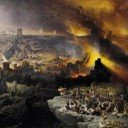It is at this point we begin our overview and review of the Book of Revelation. This is not going to be, by direct intention, a commentary of the entire book, but rather a systematic overview of the themes previously discussed as they appear in the book. For a verse by verse commentary or a more in depth look at the Book of Revelation I would recommend the following:
- Revelation, Four View: A Parallel Commentary by Steve Gregg
- Back to the Future by Dr. Ralph Bass
- The Days of Vengeance by David Chilton
Though there are several other options out there the above contain the system of interpretation that will be employed here. My highest recommendation would be the parallel commentary by Gregg as it is easy to read and presents the four basic views side by side for comparison. Also, I should note the Dr. Kenneth Gentry will be releasing a full commentary on the book of Revelation shortly.
With this post we will be dealing with the theme of the first and last chapters of the book of Revelation. Even a cursory glance should enlighten the reader as to the primary theme the threads itself throughout the entire book. The “soon” coming of the judgment against the enemies of Christ and His Church.
Below note how both the beginning and the end of the book carries this theme. It is not just a momentary notation in John’s writing but rather a strong thrust of position. It is almost like the book is “bookended” with this theme in order that the reader cannot miss it! Oddly enough, the vast majority of readers tend to miss it. I have placed in bold the timing restraints for emphasis.
Rev. 1:1-3 The revelation of Jesus Christ, which God gave him to show to his servants the things that must soon take place. He made it known by sending his angel to his servant John, [2] who bore witness to the word of God and to the testimony of Jesus Christ, even to all that he saw. [3] Blessed is the one who reads aloud the words of this prophecy, and blessed are those who hear, and who keep what is written in it, for the time is near.
Rev. 1:7 Behold, he is coming with the clouds, and every eye will see him, even those who pierced him, and all tribes of the earth will wail on account of him. Even so.
Rev. 1:9 I, John, your brother and partner in the tribulation and the kingdom and the patient endurance that are in Jesus, was on the island called Patmos on account of the word of God and the testimony of Jesus.
Rev. 1:11 saying, “Write what you see in a book and send it to the seven churches, to Ephesus and to Smyrna and to Pergamum and to Thyatira and to Sardis and to Philadelphia and to Laodicea.”
Rev. 1:19 Write therefore the things that you have seen, those that are and those that are to take place after this.
So, John sees a vision of things that were to take place soon and were near. These events were so near that those who pierced His side would see them unfold. These visions of events involved a tribulation that he also took part in at the time of the writing. John is instructed to send this letter to seven physical and actual Churches because they were to take part in these events that were to soon take place. These events were to take place after this which denotes an immediacy of a “soon” and “near” variety.
Take note now how John closes the book. Also take careful not of how John even uses the actual words of Christ as a testimony to the authenticity of the soon and near approach of these events.
Rev. 22:6-7 And he said to me, “These words are trustworthy and true. And the Lord, the God of the spirits of the prophets, has sent his angel to show his servants what must soon take place. ” [7] ” And behold, I am coming soon. Blessed is the one who keeps the words of the prophecy of this book.”
Rev. 22:10 And he said to me, “Do not seal up the words of the prophecy of this book, for the time is near.
Rev. 22:12 “Behold, I am coming soon, bringing my recompense with me, to repay everyone for what he has done.*
Rev. 22:20 He who testifies to these things says, “Surely I am coming soon.” Amen. Come, Lord Jesus!
So here John closes the book with an even stronger emphasis of the nearness of the coming. Note how the coming, though, is one of recompense and repayment, not one to set rescue, rapture or restore. This is not the Second Coming in which we find restoration and the completion of the plan of God.
This simply cannot and should not be missed. To ignore or avoid the plain text will guarantee a failed understanding of the text. If one cannot properly place within the historical context the immediacy of these words will be doomed to false interpretations and misguided exegesis.
We have previously dealt with the words soon, near, at hand, etc. These should not come as a surprise. When taken in conjunction with the understanding that this coming is one associated with those that pierced Him and involves the repayment for that act and for the persecution of the Church, the events described make more sense and, as Dr. Gentry note in his latest book, “You CAN understand Biblical prophecy.”
Why and how?
Because His word is trustworthy and true!





No comments:
Post a Comment